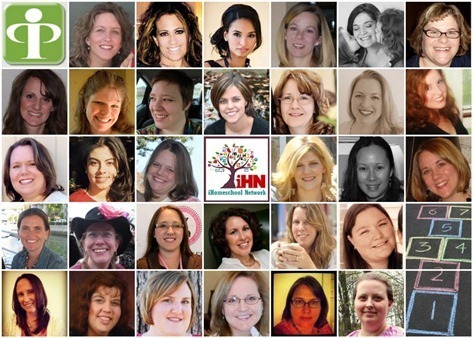Let’s Talk About Your Gifted Kids’ Learning Styles
Welcome to a new 10-day series sponsored by Prufrock Press and iHomeschool Network. 40 bloggers, more than 350 posts, and some great giveaways {including my newest book!} in the “Pin to Win” contest, all over the course of two weeks.
So far, I’ve talked about the definition of giftedness and what twice-exceptional means. I’ve also spent a little bit of time sharing why I believe that homeschooling is best for gifted learners. Today I’m going to share a bit about learning styles and why it’s important for you, a homeschooling parent, to figure out your child’s.
First, though, if your child is enrolled in school, this post is for you too. Every child, every person, learns in a specific way. But, because God made each of us unique, none of us learn in exactly the same specific way.
We each are wired to learn in a certain way, and once you figure out how your child learns best, you can maximize your days to include activities that tap into his or her style. You can Google “learning styles” or “learning styles gifted children” and get tons of hits that will help you identify the combinations of ways your unique kiddo learns best. I’m not an expert on learning styles, but I’ve looked into them, synthesized my own findings, and compiled a brief description of the seven common ones:
Visual-Spatial learners prefer using pictures, patterns, puzzles, and spatial understanding. These kids learn best whole-to-part and can develop their own methods of solving problems. They see the big picture, often missing small details along the way. Often these kids intuitively understand complex concepts, but struggle with simple skills. They are much better with reasoning than computation in math.Writing is tough, and they prefer to use a keyboard. These are the kiddos that benefit from advanced puzzles, Legos, mazes, computer games like Tetris, chess and other board games, science experiments, and computer programming.
Aural {Auditory-Rhythmic} learners like to work with sound and music. They sing, hum, play instruments, and can identify distinctions between sounds. They benefit from using sound, rhyme, and music in their learning. Chant the parts of a system in the human body, download some multiplication rap songs, sing the days of the week and the months of the year, and find other ways to put learning to music or rhyme.
Verbal-Linguistic learners do pretty well with a traditional model of education. They enjoy reading and writing, are good at remembering written and spoken information. These kids can debate and explain things very well, and use humor to convey thoughts. They benefit form memorization styles of learning, are good at writing stories, and can absorb much of their knowledge from books.
Physical {Kinesthetic or Tactile} learners like to use their body, hands, and sense of touch in all aspects of learning. They wiggle, tap, move, squirm, and are often thought of as hyperactive. They need to manipulate objects, participate in simulations, role play, and need a varied curriculum that changes frequently. Have these kids build models, do crafts, bounce on a trampoline, take walks in between activities, and work in small chunks of time.
Logical-Mathematical learners use logic, reasoning, and an understanding of systems to order their learning. These kids love computers, think abstractly, see relationships between seemingly unrelated objects, and are orderly. They thrive on games like chess, enjoy logic puzzles and brain teasers, are fascinated by chemistry. Try reading about famous mathematicians and scientists with them, visiting science museums, do experiments, watching educational programming on TV, teaching them to explore with microscopes and telescopes, and allow them to use Legos and other building bricks and materials freely.
Interpersonal {Social} learners love to work in groups or with partners. These are kids that would benefit from outside classes, co-ops, sibling collaboration, etc. They crave interaction.
Intrapersonal {Solitary} learners prefer to work alone. They want time and quiet to figure it out on their own, develop self-study techniques, and talk to you only when they need help.
Successfully homeschooling your gifted child doesn’t require you to have a master’s degree in gifted education, nor do you need to completely know and understand exactly how your child’s mind works. And, once you figure out how he learns best, your son will mature and evolve, and his preferred style will change on you. Your daughter who once loved to go to co-op will want to read and write her lessons by herself on her own timeline.
So, use this breakdown of learning styles as a guide to help you. Read them. Does your child scream at you from one of the above paragraphs? I admit… I will be revamping some of what we do because Trevor “talked” to me through these descriptions as I revisited them to write this post. I realized tonight that I’ve been struggling {once again} to force him into the mold of how I learn best. In doing so, I’m not honoring his learning styles very well.
We’ll be pulling out the chess board, some of our other games, and the logic puzzles and telescope. I’ll be reevaluating my plans for the upcoming months, asking him what topics he’s currently interested in, and finding some free lapbooks that offer minibooks {small chunks of varying styles} to help him learn about his current interest. And believe me, we’ll soon be overrun {again} with LEGO models of buildings, islands, volcanoes, and animals.
I need more space…
Drop me a line if you get a chance, either here on Twitter, Facebook, or Instagram. Let me know if these descriptions helped you to understand your gifted kiddo{s} a little better, and how you’re using them to improve and update your teaching.
Come back tomorrow when we’ll talk about asynchronous learning: what it is, how it relates to your gifted kids, and I’ll offer some suggestions for meeting the challenge of asynchronous development head-on.
If you haven’t already, please take a moment to subscribe so you don’t miss a post: Email or RSS. And, if you enjoy the platforms, you can find me
Also check out the 39 other fabulous bloggers who are participating in this 10-day Hopscotch sponsored by the iHomeschool Network and Prufrock Press.

![10-Days-of-Homeschooling-Gifted-Kids[1] 10-Days-of-Homeschooling-Gifted-Kids[1]](http://lh5.ggpht.com/-R9QeMGMVelM/UH-gIJ4130I/AAAAAAAAFVM/xDgZQOzWtIQ/10-Days-of-Homeschooling-Gifted-Kids%25255B1%25255D%25255B2%25255D.jpg?imgmax=800)

